Tottenham Hotspur’s shaky start to the season suffered another blow this week with the news that versatile midfielder Moussa Sissoko is set to miss an estimated three months of action due to knee surgery. The French international took no part in the recent FA cup tie away at Middlesbrough after picking up the injury against Southampton last week, a match in which star striker Harry Kane was also sidelined indefinitely.
The two players are just the latest to sustain long-term knocks at the North London club, with Tottenham’s physio room suffering from congestion of late.
Given that boss Jose Mourinho is relatively new in the job and has repeatedly bemoaned the little time he’s had to imprint his footballing philosophy on the squad, the latest setbacks are unlikely to help him do so in either the shorter or longer terms.
A laundry list of injuries
Indeed, the team has been beset with a host of injuries since last year. Welshman Ben Davies was already out with ankle ligament damage and fellow full-back Danny Rose would soon join him on the sidelines, leaving the club with no recognised left-sided defender on their books. Meanwhile, their pre-season preparations had been disrupted when all three summer signings (Ryan Sessegnon, Giovani Lo Celso and Tanguy Ndombele) arrived carrying knocks.
Ndombele’s issues have been particularly concerning, given that he is Spurs’ record signing and has looked sharp when on the field, but hasn’t been able to maintain his fitness.
Now Kane and Sissoko are heaping yet more misery on Mourinho. They limped off in a dour 1-0 loss to Southampton – easily Tottenham’s poorest performance under their new manager – and both will be sorely missed. Kane has had a hand in 13 of their 36 goals in the Premiership this season (11 goals and 2 assists), while Sissoko has become something of a lynchpin for the club over the past 24 months.
Midfield organiser
Sissoko was initially signed from Newcastle for a then club-record fee of €35 million after a very impressive performance at the Euros with hosts and eventual runners-up France.
The move was masterminded by his uncle and representative Bakari Sanogo, who encouraged his nephew to step up to the higher challenge. Sissoko’s Spurs career would not get off to a great start, as the Frenchman was used sparingly by Pochettino in his first two seasons at the club, thereby prolonging the time it took to find his footing in the team.
However, Sanogo was instrumental in helping Sissoko turn things around and establish himself as a trusted midfield general in Pochettino’s team. During the 2018/19 season, Sissoko became one of the first names on the team sheet and earned cult status among the fans, largely due to his excellent work ethic, superior physical strength and unpredictable bursts of pacey dribbling.
He would become instrumental in guiding Spurs to the Champions League final, where they eventually lost out to Liverpool.
Under Mourinho, Sissoko and a number of other teammates immediately enjoyed an upturn in form and he was even singled out for individual praise by his new boss, who intimated that he saw his future at the club in a more attacking role. His three-month lay-off comes as a bitter pill to swallow, especially since he had only just returned from a one-match suspension.
Mourinho must adapt
Deprived of his talismanic striker and his workhorse midfielder, Jose Mourinho now has his work cut out for him to arrest Tottenham’s slide down the table and get their season back on track. The absence of Kane could prove particularly troublesome, since he favours a style of play which prioritises playing long balls up to a target man.
The system has been hugely effective for Mourinho before: he deployed Didier Drogba (and later Diego Costa) in that role for Chelsea, as well as Zlatan Ibrahimović at Inter Milan – winning the title on all three occasions.
The early signs are that he plans to implement a similar philosophy at Spurs. While fans of fast-passing, free-flowing football might object, it’s difficult to complain too much if the evidence is taken into account. The match in which Tottenham played the fewest long balls this season (27) ended in a 1-0 home defeat to Newcastle, a team that looked destined for the drop at the time. Meanwhile, the tie in which they’ve played the most (79) was also their finest result, a 5-0 stomping of Burnley.
Mourinho would certainly argue that the ends justify the means.
The team are now deprived of Kane’s physical presence and Sissoko’s explosive drive, however. The two candidates (Lucas Moura and Heung-min Son) who could replace their captain are not well-suited to a target man role, being trickier and pacier prospects, while Sissoko’s stand-ins Eric Dier and Victor Wanyama are also not famed for either their speed or dribbling abilities. As such, Mourinho might have to return to the drawing board if he is to overcome the current malaise in the Tottenham dressing room.
Short-term fix for long-term success
Davies, Ndombele, Kane and Sissoko all remain without a firm return date, meaning Mourinho must either convince his notoriously tight-fisted chairman Daniel Levy to prize open the purse-strings this January, or else make do with the squad at his disposal.
In recent interviews, he’s repeatedly affirmed that the latter option will constitute his course of action, which means a change of game-plan must be in the offing.
There is undoubtedly plenty of attacking flair at his disposal, with Erik Lamela, Harry Winks and wantaway playmaker Christian Eriksen available alongside the wealth of creative options mentioned above. However, if Mourinho is to keep his team above water until they recover their fallen members, he must find a new way to harness their talents and get them fighting at the right end of the table again.


